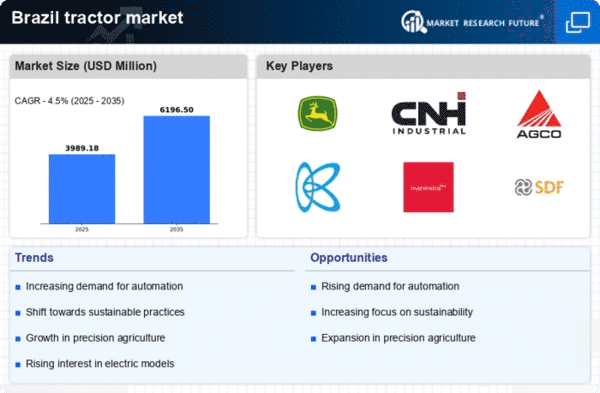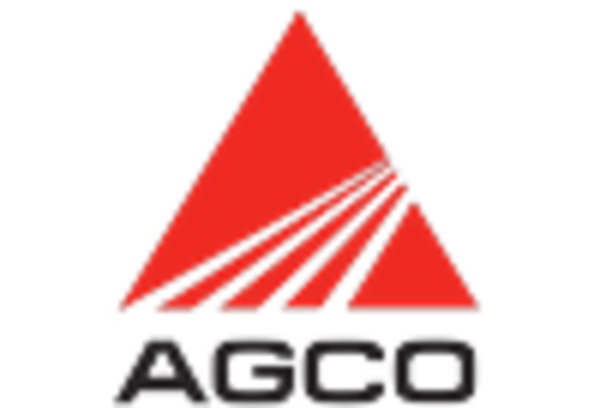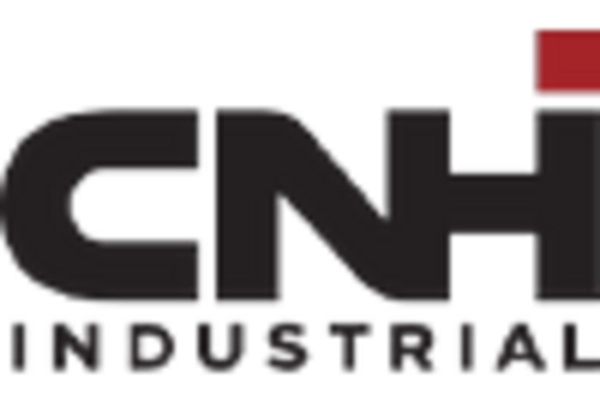Infrastructure Development
Infrastructure development is a pivotal driver influencing the tractor market in Brazil. The ongoing investments in rural infrastructure, including roads and transportation networks, facilitate easier access to markets for agricultural products. In 2025, the Brazilian government is expected to invest around $3 billion in rural infrastructure projects, which will likely enhance the efficiency of agricultural operations. Improved infrastructure allows for the seamless movement of tractors and agricultural produce, thereby increasing the attractiveness of mechanization. This trend indicates that the tractor market will continue to expand as farmers seek to capitalize on improved logistics and connectivity.
Rising Agricultural Demand
The tractor market in Brazil is experiencing a notable surge in demand driven by the increasing need for agricultural productivity. As the population grows, the demand for food escalates, prompting farmers to adopt advanced machinery to enhance efficiency. In 2025, the agricultural sector is projected to contribute approximately 5.5% to Brazil's GDP, indicating a robust reliance on mechanization. This trend suggests that the tractor market will likely see a compound annual growth rate (CAGR) of around 6% over the next five years. The integration of tractors into farming practices is essential for meeting the rising food production targets, thereby solidifying the market's growth trajectory.
Rising Export Opportunities
Brazil's position as a leading agricultural exporter is a significant driver for the tractor market. The country is one of the largest producers of soybeans, coffee, and sugar, which necessitates the use of efficient farming equipment. In 2025, Brazil's agricultural exports are projected to reach approximately $100 billion, further stimulating the demand for tractors. As farmers aim to enhance their production capabilities to meet international standards, the tractor market is likely to see increased investments in modern machinery. This trend suggests a robust growth potential as the agricultural sector continues to thrive on the global stage.
Government Support and Subsidies
Government initiatives play a crucial role in shaping the tractor market in Brazil. Various programs aimed at modernizing agriculture through financial support and subsidies are currently in place. For instance, the Brazilian government has allocated approximately $1 billion in subsidies for agricultural machinery in 2025, which is expected to stimulate the purchase of tractors. This financial backing not only lowers the entry barrier for farmers but also encourages the adoption of more efficient and environmentally friendly technologies. Consequently, the tractor market is likely to benefit from increased sales and a shift towards advanced machinery, fostering a more competitive agricultural landscape.
Technological Integration in Farming
The integration of technology into farming practices is reshaping the tractor market in Brazil. Innovations such as precision agriculture, GPS-guided tractors, and automated systems are becoming increasingly prevalent. In 2025, it is estimated that around 30% of tractors sold in Brazil will incorporate advanced technologies, reflecting a shift towards smarter farming solutions. This technological evolution not only enhances productivity but also optimizes resource usage, aligning with the growing emphasis on sustainability. As farmers recognize the benefits of these advancements, the tractor market is poised for significant growth, driven by the demand for high-tech agricultural machinery.
















